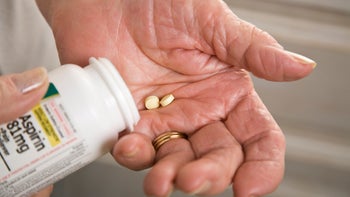
aspirin
Aspirin is an over-the-counter NSAID (nonsteroidal anti-inflammatory drug) that helps lessens inflammation. It's used to help lower fevers and relieve pain from minor injuries in people 12 years of age and older. A lower dose of aspirin is also commonly used for heart protection in certain adults who are at risk of having a heart attack or stroke. This medication most often comes as pills that are taken by mouth. Aspirin side effects include heartburn and stomach upset.

What is Aspirin?
What is Aspirin used for?
Pain relief from minor aches and pains, such as from headaches, muscle pain, toothache, menstrual cramps, and arthritis
Fever
Heart protection (lower the risk for heart attack or stroke) in certain adults - low-dose aspirin (81 mg per day) only
How Aspirin works
Aspirin is an NSAID, or a nonsteroidal anti-inflammatory drug. It works by blocking proteins in the body called cyclooxygenase (COX). There are two forms of COX proteins: COX-1 (which helps your blood clot) and COX-2 (which plays a role in causing inflammation).
At the full strength (325 mg), aspirin blocks both COX-1 and COX-2. This helps relieve swelling, pain, and fever.
At lower doses (81 mg per day), aspirin works as a blood thinner by blocking COX-1 more so than COX-2. This helps keep your platelets from clumping together in the blood and forming clots that can potentially lead to a heart attack or stroke. By preventing your platelets from sticking together and forming dangerous blood clots, low-dose aspirin might lower the risk of heart attack or stroke in certain adults.
Drug Facts
More on Aspirin essentials

Get your GoodRx coupon

What are the side effects of Aspirin?
Common Side Effects
- Stomach irritation (e.g., heartburn, stomach upset)
Serious Side Effects
- Stomach bleeding or stomach ulcer: vomit that looks like coffee grounds or has blood in it; stools that are bloody, black, or sticky; severe stomach pain; feeling faint
- Kidney damage: not urinating as often as usual, fever, muscle weakness, numbness in your arms or legs, fast heartbeat
- Overdose: nausea, vomiting, fast breathing, ringing in the ears, drowsiness, lightheadedness, confusion, seizures, hallucinations
- Reye's syndrome: vomiting, sleepiness, confusion, nightmares, aggressiveness, fast breathing, fast heart rate, coma, seizure
- Changes in hearing: ringing in the ears, loss of hearing
- Severe allergic reactions: hives, painful rash, facial swelling, wheezing, reddening or peeling of the skin, fluid-filled blisters
Source: DailyMed
More on Aspirin side effects
The following side effects have also been reported
Side effects that you should report to your care team as soon as possible:
- Allergic reactions—skin rash, itching, hives, swelling of the face, lips, tongue, or throat
- Bleeding—bloody or black, tar-like stools, vomiting blood or brown material that looks like coffee grounds, red or dark brown urine, small red or purple spots on skin, unusual bruising or bleeding
- Hearing loss, ringing in ears
- Kidney injury—decrease in the amount of urine, swelling of the ankles, hands, or feet
- Liver injury—right upper belly pain, loss of appetite, nausea, light-colored stool, dark yellow or brown urine, yellowing skin or eyes, unusual weakness or fatigue
- Rash, fever, and swollen lymph nodes
- Redness, blistering, peeling, or loosening of the skin, including inside the mouth
- Round red or dark patches on the skin that may itch, burn, and blister
Side effects that usually do not require medical attention (report these to your care team if they continue or are bothersome):
- Headache
- Loss of appetite
- Nausea
- Upset stomach

Pros and cons of Aspirin

Pros
Doesn't raise risk for heart attacks like other NSAIDs
Can help protect the heart in certain adults with or at risk for heart disease when taken at low doses (81 mg per day)
Available as a chewable tablet for people who have trouble swallowing pills
Available over the counter in a lower-cost, generic form

Cons
Has risk for stomach ulcers and bleeding
Might worsen asthma symptoms
Not recommended for relieving pain or breaking fevers for children 18 years or younger with the flu because of risk of Reye's syndrome
Can't be used in children 12 years or younger

Pharmacist tips for Aspirin

For aspirin tablets, chewable tablets, and capsules: Take aspirin by mouth with a full glass of water. Taking the medication with food can lower your risk for stomach upset.
Limit or avoid alcohol while you're taking aspirin since it can raise your risk for stomach issues.
Don't take more than one medication containing aspirin at the same time because this can raise your risk for side effects and overdose. Many common over-the-counter and prescription medications for pain, headache, cold, and flu contain aspirin. Ask your provider or pharmacist if you're unsure whether your medications contain aspirin.
If you have high blood pressure, let your provider know if your blood pressure is consistently higher than usual when you check your blood pressure. Aspirin might affect how well certain blood pressure medications work.
Stop taking aspirin and ask your healthcare provider if your pain gets worse or doesn't improve after 10 days or if your fever doesn't go away after 3 days. Also stop and ask a provider if you notice any redness, swelling, ringing in the ears, hearing loss, or any new symptoms that appear while you're taking aspirin. Your provider can examine you for other serious problems.
For aspirin suppositories for relieving pain or fever only: It's important to read and follow the directions to insert the suppositories safely and properly. Insert the suppository only into your rectum; suppositories aren't meant to be swallowed. Ask your provider whether aspirin suppositories are right for you.
More on Aspirin tips

Frequently asked questions about Aspirin

How to save using GoodRx




What are the risks and warnings for Aspirin?
Aspirin can cause some serious health issues. This risk may be even higher for certain groups. If this worries you, talk to your doctor or pharmacist about other options.

Stomach irritation, stomach bleeding, and stomach ulcers
Risk factors: Age 60 years or older | Have had stomach bleeding or ulcers in the past | Bleeding problems | Taking other NSAIDs, blood thinners (anticoagulants), or corticosteroids | Alcohol use (3 or more alcohol beverages every day) | Taking aspirin for a longer time than recommended | Taking higher doses of aspirin than instructed
Aspirin can irritate your stomach, which can cause stomach pain or heartburn. It can also lead to serious problems, including bleeding and ulcers in the stomach. The risk of stomach bleeding is higher if you're taking aspirin along with blood thinners or oral corticosteroids because these medications can also cause bleeding. Let your provider know right away if you have stomach pain that doesn't get better; vomit blood or bits that look like coffee grounds; or have bloody or black, tarry stools. These might be signs of stomach bleeding or a stomach ulcer.

Kidney problems
Risk factors: History of kidney problems | History of liver problems | History of heart failure | Taking 325 mg of aspirin or greater for a long time | Taking certain blood pressure medications (water pills, ACE inhibitors, or ARBs) | Dehydration | Age 65 and older
At doses of 325 mg or greater, aspirin can lower blood flow in the kidneys, which can sometimes cause damage to the kidneys. The risk is higher if you already have kidney problems, liver problems, or heart failure. You're also at higher risk if you're taking other medications that might harm the kidneys, such as blood pressure medications like lisinopril (Zestril) and losartan (Cozaar). Stop taking aspirin and let your provider know if you're not urinating as often as usual or if you have fever, muscle weakness, numbness in your arms or legs, or a fast heartbeat. These can be signs of kidney damage.

Reye's syndrome in children
Risk factors: Children 18 years or younger recovering from chicken pox or flu-like symptoms
Aspirin use in children is linked to a rare, but serious and life-threatening condition called Reye's syndrome. Children recovering from flu-like symptoms or other viruses who take aspirin are at high risk for this dangerous condition. Early symptoms of Reye's syndrome include vomiting, sleepiness, confusion, nightmares, aggressiveness, and fast breathing and heart rate. But if left untreated, it can lead to coma and seizures. Get medical help as quickly as possible if any of these symptoms occur.
To avoid Reye's syndrome in children, don't give aspirin or any medications that contain aspirin to a child with chicken pox or flu-like symptoms. Ask your healthcare provider for recommendations for children who are sick.

Harm to an unborn baby
Risk factors: At 20 weeks or later in pregnancy | Taking 325 mg of aspirin or greater
If you're at least 20 weeks along in your pregnancy, don't take aspirin doses that are 325 mg or higher. This can cause problems with your baby's growth and development; it can harm your unborn baby's kidneys and heart. Ask your healthcare provider about alternative medications that are safer to help with pain and fever during pregnancy.

Severe allergic reactions and skin reactions
Although rare, it's possible to have a severe and life-threatening allergic reaction to aspirin. These allergic reactions can include hives, facial swelling, and wheezing. Aspirin can also cause severe skin reactions, such as reddening or peeling of the skin, painful rash, and fluid-filled blisters. Stop taking aspirin and go to the emergency room right away if you experience any of these symptoms.

Different aspirin strengths available
If your provider has recommended that you take low-dose aspirin (81 mg per day), make sure you're taking the correct strength and not strengths or doses that are 325 mg or greater. Higher doses of aspirin don't work the same way as the lower dose. And accidentally taking a higher dose of aspirin than prescribed can raise your risk for side effects.
More on Aspirin warnings

Aspirin dosage forms
Typical dosing for Aspirin
Adults and children 12 years or older
Tablets, chewable tablets, and capsules (Vazalore): The typical dose is 325 mg to 650 mg by mouth every 4 hours on an as-needed basis for pain or fever.
Suppository: Each suppository contains either 300 mg or 600 mg of aspirin. The typical dose is 1 suppository inserted into your rectum every 4 hours for no more than 10 days or as instructed by your provider.
Don't take more than 4 grams of aspirin in a 24-hour period.
Ask your provider to see whether taking low-dose aspirin (81 mg) once daily is right for you and what dose you should take for your health condition.
Children under 12 years: Aspirin isn't recommended for children in this age group. Ask your child's healthcare provider to see what other pain and fever medications your child can take.
More on Aspirin dosage forms

How much does Aspirin cost?

Aspirin contraindications
Allergy to aspirin or any other pain or fever reliever

What are alternatives to Aspirin?
Pain relief from minor aches and pains, such as from headaches, muscle pain, toothache, menstrual cramps, and arthritis
Fever
Heart protection (lower the risk for heart attack or stroke) in certain adults - low-dose aspirin (81 mg per day) only
Short-term relief of minor aches and pains due to headache, muscle aches, minor arthritis pain, toothache, backache, the common cold, or menstrual cramps
Fever
Mild-to-moderate pain
Pain from rheumatoid arthritis (RA) or osteoarthritis (OA)
Pain from menstrual cramps

What is the latest news about Aspirin?

Aspirin images
Get savings updates for Aspirin
Receive price alerts, news, and other messages from GoodRx about Aspirin and other healthcare topics and relevant savings offers.By signing up, I agree to GoodRx's Terms and Privacy Policy, and to receive marketing messages from GoodRx.
References
Best studies we foundAmerican College of Obstetricians and Gynecologists. (2018). Low-dose aspirin use during pregnancy.
Arnett, D. K., et al. (2019). 2019 ACC/AHA guideline on the primary prevention of cardiovascular disease. Circulation.
Awtry, E. H., et al. (2000). Aspirin. Circulation.
Bayer HealthCare LLC. (2023). Bayer Genuine Aspirin- aspirin tablet [package insert]. DailyMed.
Dovizeo, M., et al. (2012). Mechanistic and pharmacological issues of aspirin as an anticancer agent. Pharmaceuticals.
Lee, S. Y., et al. (2019). Phenotypes of severe cutaneous adverse reactions caused by nonsteroidal anti-inflammatory drugs. Allergy, Asthma & Immunology Research.
Major Pharmaceuticals. (2023). Aspirin low dose chewable orange- aspirin tablet, chewable [package insert]. DailyMed.
National Kidney Foundation. (n.d.). Pain medicines (analgesics).
Padagis US LLC. (2022). Aspirin suppository [package insert]. DailyMed.
Peters, A. T., et al. (2020). Aspirin for prevention of cardiovascular disease. Journal of the American Medical Association.
PLx Pharma Inc. (2023). Vazalore- aspirin capsule [package insert]. DailyMed.
SafeMedication. (n.d.). How to use rectal suppositories.
Smith, S. C., et al. (2011). AHA/ACCF secondary prevention and risk reduction therapy for patients with coronary and other atherosclerotic vascular disease: 2011 update: A guideline from the American Heart Association and American College of Cardiology Foundation Endorsed by the World Heart Federation and the Preventive Cardiovascular Nurses Association. Journal of the American College of Cardiology.
Taubert, K. A. (2008). Can patients with cardiovascular disease take nonsteroidal antiinflammatory drugs? Circulation.
Triplitt, C. (2006). Drug interactions of medications commonly used in diabetes. Diabetes Spectrum.
U.S. Food and Drug Administration. (2018). FDA drug safety communication: FDA strengthens warning that non-aspirin nonsteroidal anti-inflammatory drugs (NSAIDs) can cause heart attacks or strokes.
U.S. Food and Drug Administration. (2022). FDA recommends avoiding use of NSAIDs in pregnancy at 20 weeks or later because they can result in low amniotic fluid.
Compare other Rheumatoid Arthritis, Osteoarthritis, Pain, Fever, Menstrual Pain drugs
Browse medications
View AllResearch prescriptions and over-the-counter medications from A to Z, compare drug prices, and start saving.






















